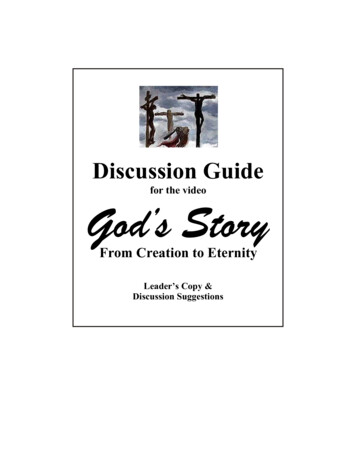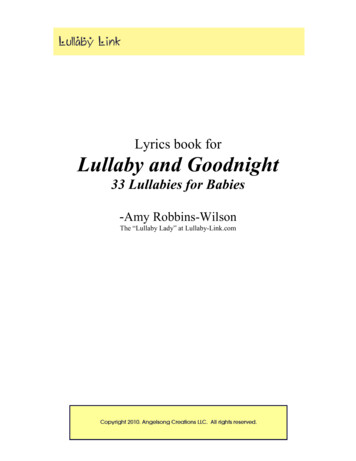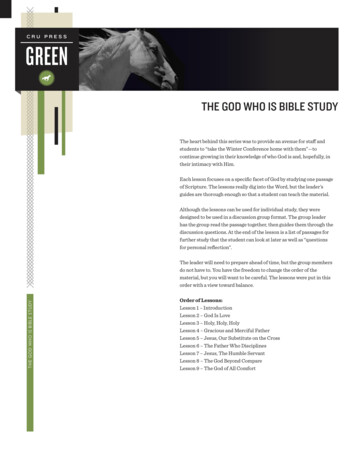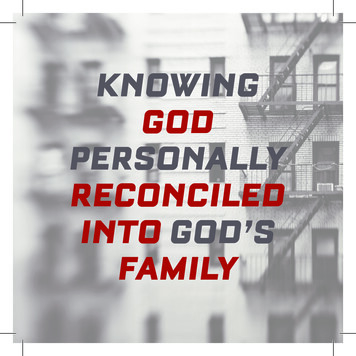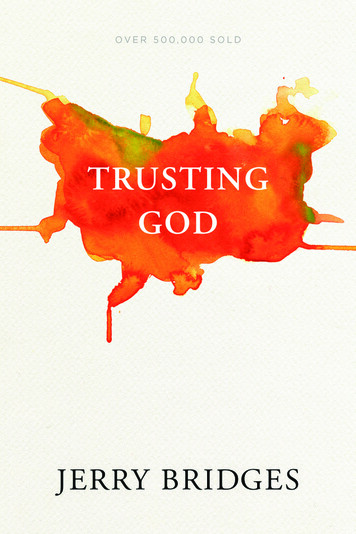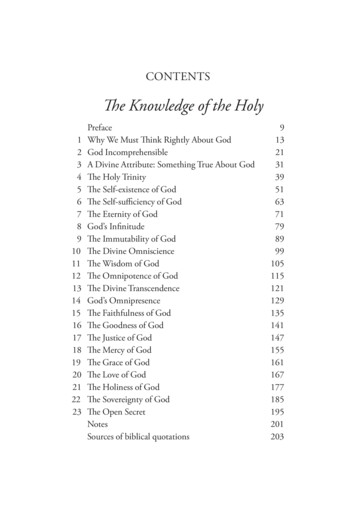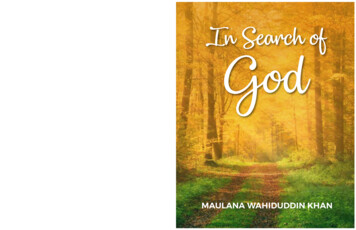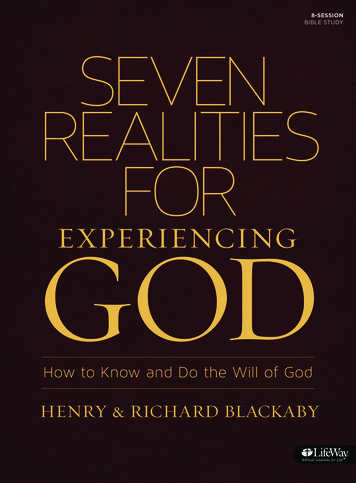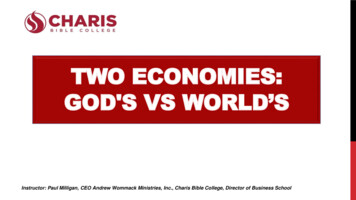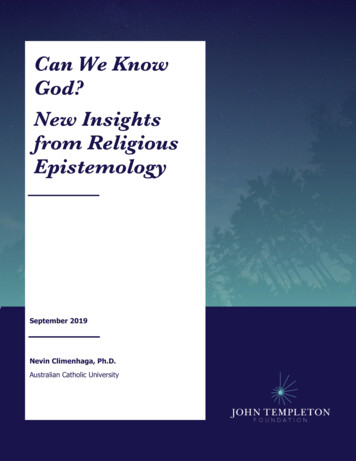
Transcription
Can We KnowGod?New Insightsfrom ReligiousEpistemologySeptember 2019Nevin Climenhaga, Ph.D.Australian Catholic University
Table of ContentsI. Introduction . 3II. New Trends in Epistemology . 5Knowledge-First EpistemologyContextualism and Interest-RelativismSocial EpistemologyFormal EpistemologyCognitive Science and EpistemologyIII. Notable Publications . 12Religious TestimonyThe Problem of EvilEvolutionary Debunking ArgumentsFine-TuningPascal’s WagerReligious PracticeIV. Reflections and Future Directions . 24Defeat and ProbabilityProbability and Fine-TuningIntegrationV. Works Cited . 342
I. INTRODUCTIONSince the resurgence of analytic philosophy of religion in the late twentieth century, epistemologicalquestions have been central to the discipline. Are religious beliefs rational? Do we need argumentsto know that God exists? Are the evils we observe in the world evidence against theism? The twoleading theistic philosophers in these debates were Alvin Plantinga and Richard Swinburne.Plantinga argued that belief in God, and religious belief more generally, could be “properly basic”—not based on further arguments or evidence. 1 This position came to be known as “reformedepistemology.” Swinburne, on the other hand, defended several evidential arguments for theexistence of God and the truth of Christianity, using the tools of probability theory to measure theircumulative force. 2 Plantinga’s project was integrated with the broader defense of a properfunctionalist theory of knowledge, on which what we know depends on how we were designed to goabout forming beliefs. Swinburne’s project was integrated with a broader exploration of the role thatprobability theory plays in empirical inquiry.The extent of disagreement between Plantinga and Swinburne can be exaggerated. 3 But, broadlyspeaking, the two philosophers represent two largely distinct research programs among theisticepistemologists of religion: one advancing evidential arguments for religious claims and critiquingevidential arguments against religious claims, and the other defending religious belief withoutappealing to such arguments. These two research programs are broadly representative of two largerpositions in epistemology: internalism, according to which the rationality of beliefs is onlydetermined by factors internally accessible to the believer (such as whether one has evidence for thebelief), and externalists, according to which the rationality of beliefs can be partly determined byother factors (such as whether one’s belief is causally connected with the facts).While debates between these two camps (both in religious epistemology in particular and inepistemology more generally) have not been resolved, they have in recent years largely given way towork on other problems. These include the extent to which practical considerations influence whatwe know, the proper response to testimony and disagreement, the epistemological implications ofempirical cognitive science, and the relation of knowledge and action. For example, does researchon the evolutionary origins of religion, or the existence of religious disagreement, threaten therationality of religious belief and practice?This report reviews research supported by two recent Templeton research grants focused onreligious epistemology. New Insights and Directions for Religious Epistemology, led by JohnSee especially Plantinga 1983 and 2000. In 2017, Plantinga was awarded the Templeton Prize for his work inreligious epistemology ntinga.html).12See especially Swinburne 1979.See, for example, Walls and Dougherty (ed.) 2018, which explores several natural theological arguments suggested byPlantinga, and Swinburne 2018, which explores the conditions under which religious experience can justify theisticbelief, even in the absence of the believer explicitly formulating arguments.33
Hawthorne, explores the implications of recent work in epistemology on questions in theepistemology of religion. Knowing in Religion and Morality, led by Michael Bergmann and PatrickKain, focuses on skeptical challenges to moral and religious beliefs based on the presence ofdisagreement about moral and religious questions and the evolutionary origins of moral and religiousbeliefs.The central output of each grant was an edited volume: for the first, Knowledge, Belief, and God:New Insights in Religious Epistemology (2018), edited by Matthew Benton, John Hawthorne, andDani Rabinowitz; for the second, Challenges to Moral and Religious Belief: Disagreement andEvolution (2014), edited by Michael Bergmann and Patrick Kain. I shall refer to the former as KBGand the latter as CMRB. The Knowing grant also resulted in several journal articles, and the NewInsights grant in several books and over 50 journal articles.The publications supported by the grants are not all “on topic:” many outputs from the New Insightsgrant in particular only discuss more general epistemological issues. Some of these, such asBallantyne 2014, Tucker 2014, Hedden 2015a and 2015b, Anderson 2015, and Benton 2016, havebeen quite influential. (These publications have all been cited more than 20 times.) 4 I restrict mydiscussion here to publications in religious epistemology (with occasional discussion of the moralepistemology outputs of the Knowing grant that connect with religious epistemology), focusing onthose publications which have been particularly impactful or which I found especially insightful.While, as I note above, religious epistemologists have largely turned their focus away from the debatebetween evidentialists and reformed epistemologists, I was struck in reviewing the publicationsresulting from these two grants how much the split between these two approaches continues to shapethe work done in the field. I note below some places in which this influence is especially apparent,and then at the end of this report, in discussing future directions for religious epistemology, I comeback to the implications of this division.The remainder of this report is structured as follows. In Section 2, I summarize some major researchtopics in recent epistemology—knowledge-first epistemology, contextualism and interest-relativism,social epistemology, formal epistemology, and empirically informed epistemology—and discuss howthe grant publications have applied them to religious epistemology. In Section 3, I highlight thirteenarticles that strike me as especially significant, grouped under six major topics they cover: testimonyand disagreement, the problem of evil, evolutionary debunking arguments, the fine-tuning argument,Pascal’s wager, and religious practice. In Section 4, I reflect on some trends revealed in the previousdiscussion and suggest some future directions for religious epistemology.4All my citation data in this review is taken from Google Scholar in May 2019.4
II.NEW TRENDS IN EPISTEMOLOGYThe central question of late twentieth century epistemology was: What is knowledge? Thisdiscussion was framed by Edmund Gettier’s 1963 paper, “Is Justified True Belief Knowledge?”which argued that there are some cases in which a person is highly justified in believing a proposition,that proposition is true, and yet the person does not know it to be true. One of his cases (slightlyrevised) goes like this. Smith, a job applicant, has very strong evidence that he will get the job, andvery strong evidence that he has ten coins in his pocket (he counted them a moment ago). He infersfrom this that the man who will get the job has ten coins in his pocket. Moreover, this proposition istrue, because another job applicant, Jones, is going to get the job, and happens to also have ten coinsin his pocket. In this case, Smith has a justified true belief that the man who will get the job has tencoins in his pocket. And yet, he clearly does not know that the man who will get the job has ten coinsin his pocket. This shows that justified true belief is not sufficient for knowledge.After Gettier, epistemologists proposed a number of different theories of knowledge, most aimed atgiving necessary and sufficient conditions for the circumstances under which a person knows aproposition to be true. Some added additional conditions to justification, truth, and belief, whileothers presented completely different accounts of knowledge. No theory gained widespreadacceptance. Eventually the project of analyzing knowledge fell out of fashion—not because it hadbeen resolved, but because it seemed irresolvable.In more recent epistemology (starting, roughly, in the 1990s), the topics of conversation have beenmore diverse. In the remainder of this section I describe five broad trends in recent epistemology.Knowledge-First EpistemologyWhile philosophers have largely stopped trying to give an analysis of knowledge—that is, a set ofnecessary and sufficient conditions for when someone knows a proposition—a number of researchprojects have nevertheless advocated some new ways of thinking about knowledge. The first of theseresearch projects, pioneered by Timothy Williamson (2000), responds to the failure of the postGettier research program by arguing that knowledge is a primitive mental state, and thusunanalyzable. Instead of seeking to analyze knowledge in terms of justification, belief, and so on,knowledge-firsters argue that we should understand these other concepts partly in terms ofknowledge.Knowledge-first epistemology has a number of interesting implications for religious epistemology.One of Williamson’s most discussed theses is that our mental states—such as knowledge, belief, andhope—are not always accessible to us. We are not always in a position to know what we know, orbelieve, or hope. Rabinowitz (2018) notes that this implies that we are not always in a position toknow when we’ve sincerely repented for past sins. She argues that in orthodox Judaism, on whichdivine forgiveness requires sincere repentance, this makes it hard for us to know that God has trulyforgiven us and so experience the cathartic value of repentance that is central to the repentanceprocess.5
Perhaps the most important knowledge-first claim for religious epistemology is that “E K”—that is,our evidence (E) consists of what we know (K). What we know is thus the standard relative to whichwe can judge the plausibility of our other beliefs. Williamson thinks that we can know things whichgo beyond our internal experience, and as noted above, he thinks we are fallible even about thecontents of that experience. Thus, it is not always internally accessible to us what our evidence is.We cannot always know what it is that we know. In this sense Williamson is an externalist. However,his epistemology is in some ways a middle ground between traditional forms of internalism andexternalism in religious epistemology. For once our evidence is fixed, how confident we ought to bein any proposition is plausibly determined by the probability of that proposition given our evidence(Williamson 2000: ch. 10). If the relevant probabilities here are knowable a priori—if we are able todiscern them by reflection—then Williamson’s epistemology is (like Plantinga’s) externalist when itcomes to what our evidence is, but (like Swinburne’s) internalist when it comes to how that evidencebears on our beliefs.As multiple grant authors observe, Williamson’s externalist conception of evidence has strongimplications for evaluating the rationality of religious beliefs. Broadly speaking, it implies that it iseasier for “dogmatic” religious or irreligious beliefs to be justified. Suppose, for example, that I cancome to know that Jesus was resurrected by believing the resurrection reports in the New Testament(Anderson 2018: 26). That Jesus was resurrected is now part of my evidence, and the probabilitythat Jesus was resurrected, given my evidence, is accordingly 100%—and this can be so even if theprobability that Jesus was resurrected on my other evidence is low. If my confidence in a propositionshould be proportional to its probability on my evidence, then I can come to be maximally confidentthat Jesus was resurrected, even if prior to coming to know that Jesus was resurrected this propositionwas antecedently quite improbable for me. Moreover, I can apparently rationally dismiss what would(if I did not know that Jesus was resurrected) be evidence against this belief, such as disagreementon the part of my Muslim peers (Baker-Hytch 2018: 196).The above example supposes that I can come to know that Jesus was resurrected. But suppose thatJesus was not resurrected, and moreover, that no other miracles have occurred either. Then, since(as all philosophers agree) knowledge requires truth, I cannot come to know that Jesus wasresurrected. On the other hand, if a skeptic is able to know that miracles do not occur, then thatmiracles do not occur can be part of that skeptic’s evidence, and she can become rationally certainthat miracles do not occur, dismissing reports of the resurrection out of hand (cf. Benton,Hawthorne, and Isaacs 2016; Benton and Hawthorne 2018). In this way an externalist conceptionof evidence can rationalize dogmatism on the part of either the religious believer or the skeptic,depending on the facts of the matter.Contextualism and Interest-RelativismA second research project diverges from the post-Gettier project of analyzing knowledge in adifferent way. Traditional analyses of knowledge take it for granted that when we say something like,“Smith knows that he has ten coins in his pocket,” the meaning of “knows” in this sentence does notdepend on the context. The contextualist denies this, holding that what kind of state is picked outby “knows” depends on the context in which the word is used (DeRose 1999). Contextualists will6
typically hold that in contexts in which skeptical hypotheses are being discussed, or speakers thinkthat getting it right is very important, “knows” will pick out a harder-to-reach state—for example, itwill pick out a state that requires absolute certainty, rather than mere high probability.Even if we grant that “knows” means the same thing in all contexts, there is a question of whetherknowledge is dependent purely on “epistemic” factors—like the evidence one has—or is alsodependent on “practical” factors—like the risks associated with being wrong. Traditional analyses ofknowledge assumed that practical factors did not impact whether one knows. Interest-relativists, bycontrast, argue that one’s practical interests can affect one’s knowledge: it is harder to know, theyclaim, when the costs of one’s being wrong would be very high.Eaton and Pickavance (2017) and Benton (2018) explore the implications of interest-relativism forreligious epistemology. The core idea they defend is that interest-relativism creates an asymmetrybetween theistic and atheistic belief. For, as Pascal famously observed, given a traditional Christianview of the afterlife, if you believe theism, you gain everything (paradise) if you are right, and loselittle (earthly pleasures) if you are wrong; while if you believe atheism, you lose everything(damnation) if you are wrong, and gain little (earthly pleasures) if you are right. Most forms ofinterest-relativism say that how hard it is to know a proposition is proportional to how strongly one’spractical interests favor believing it. This makes it very hard—perhaps impossible—to know thatatheism is true, even if it is, while much easier to know that theism is true, if it is. If, moreover, beliefaims at knowledge, then this knowledge-asymmetry may give us a non-evidential epistemic reason tobelieve theism, but disbelieve atheism (Benton 2018: 280-84).Social EpistemologyRecent epistemology has seen a flourishing of interest in the social aspects of knowledge and belief—including especially the ways in which our beliefs about the world depend on the testimony of others,and the challenges to our beliefs that arise from others’ disagreement. A large number of grantauthors discuss issues related to testimony and disagreement, the latter being one of the main focusesof the Knowing grant. I summarize some of these particular articles in Section 3 below; here I notebroad themes.On testimony, one of the main issues is the conditions under which we can gain knowledge throughtestimony, or rationally believe what others say. Many religious believers today base their beliefs onthe testimony of those they take to be “experts,” such as their pastors or parents, an issue Lackey(2018) and Fricker (2014) discuss. Testimony is particularly important within Christianity, becausemany of the central claims of Christianity, such as the resurrection, are historical claims thatsubsequent generations of Christians believe on the basis of the testimony of those who claim to haveobserved them. The eighteenth-century philosopher David Hume was famously critical of basingreligious faith on such testimony, arguing that it is never rational to believe a miracle claim, becauseit is always more likely that the testifier is lying or mistaken than that the laws of nature have beenviolated. Anderson (2018) critically discusses Hume’s argument, examining under what conditionsthe reasons Hume gives to think that testimony to miracles tends to be unreliable is a “defeater” forbelief in a miracle report.7
The issue of testimony is also particularly important for the intersection of religion and morality, atheme explored by several contributors to CMRB. Theists who believe that God has in some wayspecially revealed himself typically take moral claims to be a central part of God’s revelation. Theseclaims can be at odds with the “wisdom of the world” (the apostle Paul’s words in 1 Corinthians1:20, quoted in Pittard 2014), leading to disagreements between religious and secular moralities over,for example, whether all human life is sacred, or whether only humans with the capacity forrationality have moral worth (Jackson 2014). One pressing issue for theists who base their moralbeliefs on revelation is then the circumstances under which they should trust a purported divinerevelation—an issue Hare (2014) takes up in his contribution to the volume.One threat to religious beliefs based on testimony is the existence of religious disagreement. Just asChristians believe that God has revealed himself through the incarnation, for example, Muslimsbelieve that God has revealed himself through the Qu’ran. Baker-Hytch (2018) critically examinesvarious arguments from religious disagreement against testimony-based religious belief.More generally, the existence of disagreement about religious claims—held on whatever basis—threatens the rationality of those beliefs. Recent work in epistemology explores under whatcircumstances disagreement from an “epistemic peer” should lead one to become less confident inone’s own position. This issue is explored by Audi (2014), Pittard (2014), Goldberg (2014), Lackey(2014), and Bergmann (2015).An important point highlighted in several of these discussions is that the extent of disagreementbetween, for example, theists and atheists will tend to make it harder to identify dispute-independentreasons that one could give to either party as to why they should take their disputant to be reliable.For example, theists and atheists may disagree not only about first-order moral claims, like thepermissibility of abortion or of same-sex relationships, but also disagree about what the most reliablesources for learning about morality are, with atheists placing greater weight on intuition and reasonand theists placing greater weight on tradition and revelation. In turn, disagreement about thereliability of, say, revelation may turn on disagreement about methods for evaluating testimony, suchas whether it can ever be rational to accept the testimony of someone who purports to have witnesseda miracle.Pittard (2014) and Bergmann (2015) argue that the wide-ranging nature of such disagreement notonly makes it harder to resolve as a practical matter, but also makes it harder to formulate a plausibleprinciple on which (for example) theists should revise their beliefs in response to this disagreement(but see Lackey 2014 for a contrary view). “Conciliationist” views of disagreement hold that in a widerange of disagreements, one should revise one’s views in the direction of one’s interlocutors. Pittard,whose chapter I explicate more fully below, argues that the only plausible form of conciliationism isone on which one should only “conciliate” with those whom one has dispute-independent reasonsto think are reliable. For the theist and atheist who disagree on so many fundamental questions, itwill be hard to identify dispute-independent reasons for theists to think their atheist interlocutorsreliable; a plausible form of conciliationism will thus not enjoin them to respond to the disagreementof atheists by becoming less confident in their theism.8
Formal EpistemologyWhile late twentieth-century epistemology focused on the nature of knowledge, epistemology inmore recent years has focused also on the nature of, and norms governing, rational belief. Thisincludes, as above, the conditions under which we can rationally believe others’ testimony, or howwe ought to react to peer disagreement or the raising of practical stakes. For example, high stakesmay preclude knowledge, but not rational belief. Or they may preclude both. But the two issues arein principle separable.One area where this shift toward the study of rational belief is especially clear is in the application offormal methods to epistemology. The application of probability theory to scientific reasoning was amajor theme in twentieth-century philosophy of science (see, for example, Swinburne 1973 andHowson and Urbach 1989). Toward the end of the twentieth century, the application of probabilityto reasoning more generally became a major topic of epistemology proper. Epistemologists beganto recognize more explicitly that much of our reasoning about the world is uncertain, and thatmathematical probability is a useful way to quantify that uncertainty.The relation of probability to rational belief is not straightforward. One natural idea is that we believeonly those propositions which we take to be sufficiently probable (or are sufficiently confident in)and that we should believe only those propositions which really are sufficiently probable given ourevidence. Swinburne (2018) and Wedgwood (2014) endorse the first of these theses, taking thethreshold of belief to be probability or degree of confidence 1/2 (since this is the point at which oneis more confident in a proposition than in its negation). The second thesis was suggested in myexposition of knowledge-first epistemology above, on which our evidence is what we know, and therationality of our beliefs is determined by the probability of those beliefs on our evidence.Some interest-relativists, however, will hold that there is no constant threshold for “sufficientlyprobable”—it is not as if I should believe all and only those propositions with probability above .5,or .9, or some other threshold. Instead, what counts as “sufficiently probable” depends on the stakes.We have already seen in the discussion of Eaton and Pickavance (2017) and Benton (2018) abovehow this can affect the rationality of religious belief. Buchak (2014) explores how different views onthe relationship between probability and belief will lead to different views on the relationshipbetween belief and faith. She suggests that on interest-relativism, rational belief and rational faith willbe closely related, for what it is to have faith in some proposition is to be committed to acting on thatproposition and not searching for further evidence for or against it (see Buchak 2012).Historically, the application of probability theory to the philosophy of religion was pioneered bySwinburne in his exposition of natural theological arguments for Christian theism. In the outputs ofthe New Insights grant, probability theory takes center stage in discussions of the fine-tuningargument for God’s existence (Choi 2018, Halvorson 2018, Hawthorne and Isaacs 2018, Hawthorneand Isaacs 2017). The fine-tuning argument begins from the finding of modern physics that it is quitedifficult for the universe’s laws to allow for life, in the sense that the various parameters that featurein fundamental physical theories—things like the mass of the neutron, the strength of gravity, and thedegree of entropy in the original conditions of the universe—need to be “fine-tuned” in order for theuniverse to allow for life, or indeed any kind of complex matter. In spite of this fact, our universe9
does, in fact, allow for life. The fine-tuning argument takes this to be evidence for theism overnaturalism, for if naturalism is true, the physical facts above make the existence of life extraordinarilyunlikely, while if theism is true, the existence of life is comparatively unsurprising.There are many advantages to modeling the fine-tuning argument probabilistically. Perhaps foremostamong them is that, if we can agree on the probabilistic premises, such as how probable the evidenceis given theism and given atheism, then we can get probabilistic conclusions from the mathematicsalone. For example, if we can agree that the probability of theism apart from the fine-tuningevidence—its “prior probability”—is not too low, and we can agree that the fine-tuning evidence ismuch more likely given theism than given atheism, then it will follow that the probability of theismgiven the fine-tuning evidence—its “posterior probability”—will be high (with the exact posteriorprobability depending on the exact values of the probabilities in the premises). One can then sidestepquestions about whether fine-tuning “cries out for explanation” (Hawthorne and Isaacs 2018: 14143), along with accusations of “God-of-the-gaps” reasoning and other objections that do not actuallychallenge any of the argument’s probabilistic premises (Hawthorne and Isaacs 2017: 139-42).However, partly due to underlying disagreements about the metaphysics and epistemology ofprobability, agreement that the fine-tuning argument should be modeled probabilistically does notnecessarily lead to agreement on what the correct probabilistic formulation of the argument is, muchless on whether the argument is successful. I discuss this issue further in Section 4.2, aftersummarizing Hawthorne and Isaacs 2017 and 2018 in more depth in Section 3.Cognitive Science and EpistemologyA final trend in recent epistemology is increased attention to the empirical study of people’s beliefforming practices. Interest in the way in which “the folk” react to philosophical thought experimentsand form philosophical intuitions has led to the new sub-field of experimental philosophy (Knobeand Nichols 2017). In the epistemology of religion, the most salient empirical research comes fromcognitive science and evolutionary psychology, which study the ways in which religions are formedand their evolutionary and cultural origins.Sosis and Kiper (2014) and Thurow (2014) summarize different research programs in the empiricalstudy of religion. One research program explores how our cognitive templates, such as a tendencyto ascribe agency to objects, makes it easy for us to form religious beliefs. Another research programbegins with the evolutionary assumption that nature selects for behaviors that lead to reproductivesuccess. This program also explores how religious behaviors can enhance fitness through, forexample, promoting group cooperation. Sosis and Kiper argue that both these approaches havemerit, but neither is complete: the first focuses solely on belief, and the second solely on behavior,while in fact religions are complex systems that integrate both belief and behavior.Some skeptics have argued that the empirical findings of these research programs show religiouscommitments to be irrational. Thurow and Sosis and Kiper both challenge this claim. A commontheme of their critiques is that skeptics tend to distort and oversimplify the empirical science that issupposed to debunk religious commitment. Religion is a complex and varied phenomenon, and theexplanation of why people are religious will not be the same for different religious groups, or for all10
members of the same religious group. In Section 3 below I discuss FitzPatrick’s (2014) similarcritique of attempts to use evolutionary theory to debunk moral belief.A notable feature of Sosis and Kiper’s critique is that it shifts the conversation away from solelyfocusing on religious belief. Sosis and Kiper argue that being religious involves much more thanbelief—it involves ritual behavior, moral commitments, social connections, and so on. While it isnecessary for group cohesion that some members of the group believe the religion’s propositionalclaims, for most members, it is enough that they “accept” them—committing themselves publicly toliving in accordance with them. Hence, showing that, for example, religious beliefs originally arosefrom a “hyper-sensitive agency detection device” does not show contemporary religious commitmentto be irrational.Against Sosis and Kiper, de Cruz (2018) argues that evolutionary accounts of religion can challengethe rationality of religious practices as well. Her argument starts from the assumption that somereligious practices aim at
Kain, focuses on skeptical challenges to moral and religious beliefs based on the presence of disagreement about moral and religious questions and the evolutionary origins of moral and religious beliefs. The central output of each grant was an edited volume: for the first, Knowledge, Belief, and God:
